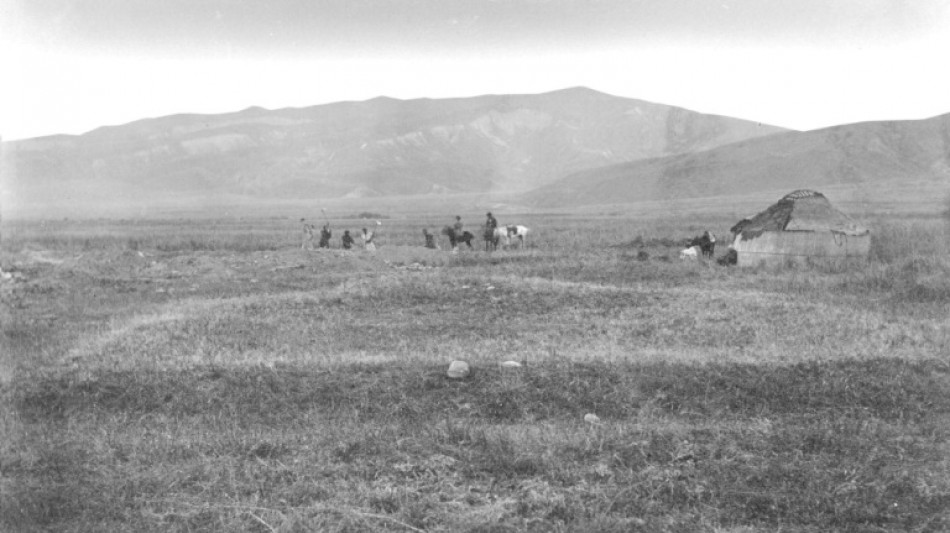
-
 Laurent Mauvignier wins France's top literary award for family saga
Laurent Mauvignier wins France's top literary award for family saga
-
Indian Sikh pilgrims enter Pakistan, first major crossing since May conflict

-
 Former US vice president Dick Cheney dies at 84
Former US vice president Dick Cheney dies at 84
-
Fiorentina sack Pioli after winless start in Serie A

-
 Oscar-winning Palestinian films daily 'Israeli impunity' in West Bank
Oscar-winning Palestinian films daily 'Israeli impunity' in West Bank
-
Spain's Telefonica shares drop on dividend cut, net loss

-
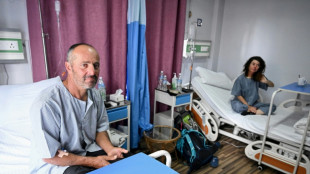 Fierce mountain storms kill nine in Nepal
Fierce mountain storms kill nine in Nepal
-
Divisive Czech cardinal Dominik Duka dies at 82
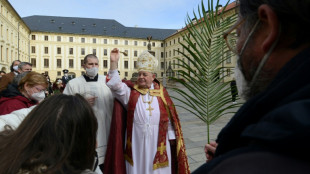
-
 Shein vows to cooperate with France in sex doll probe
Shein vows to cooperate with France in sex doll probe
-
EU in last-ditch push to seal climate targets before COP30

-
 Finnish ex-PM Marin says her female cabinet faced torrent of sexism
Finnish ex-PM Marin says her female cabinet faced torrent of sexism
-
Sudan army-backed council to meet on US truce proposal: govt source

-
 BP profit surges despite lower oil prices
BP profit surges despite lower oil prices
-
Shein vows to cooperate with France in childlike sex doll probe

-
 National hero proposal for Indonesia's Suharto sparks backlash
National hero proposal for Indonesia's Suharto sparks backlash
-
Indian great Ashwin out of Australia's BBL after knee surgery

-
 Indian Sikh pilgrims enter Pakistan, first major crossing since May conflict: AFP
Indian Sikh pilgrims enter Pakistan, first major crossing since May conflict: AFP
-
Asian markets slip as traders eye tech rally, US rate outlook

-
 Nintendo hikes Switch 2 annual unit sales target
Nintendo hikes Switch 2 annual unit sales target
-
Typhoon flooding kills 5, strands thousands in central Philippines

-
 Jobe Bellingham finding his feet as Dortmund head to City
Jobe Bellingham finding his feet as Dortmund head to City
-
US civil trial to hear opening arguments on Boeing MAX crash

-
 Jamie Melham on Half Yours only second woman to win Melbourne Cup
Jamie Melham on Half Yours only second woman to win Melbourne Cup
-
Myanmar scam hub sweep triggers fraudster recruitment rush

-
 Biggest emitter, record renewables: China's climate scorecard
Biggest emitter, record renewables: China's climate scorecard
-
Floods strand people on roofs as typhoon pounds Philippines
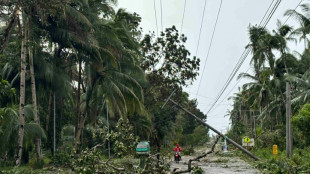
-
 Asian markets swing as trades eye tech rally, US rate outlook
Asian markets swing as trades eye tech rally, US rate outlook
-
South Korea to triple AI spending, boost defence budget

-
 Trott to leave as Afghanistan coach after T20 World Cup
Trott to leave as Afghanistan coach after T20 World Cup
-
Late queen's fashion to go on show at Buckingham Palace

-
 In Morocco, exiled Afghan women footballers find hope on the pitch
In Morocco, exiled Afghan women footballers find hope on the pitch
-
EU scrambles to seal climate deal ahead of COP30

-
 New Yorkers expected to pick leftist Mamdani in stunning election
New Yorkers expected to pick leftist Mamdani in stunning election
-
Pining for Pinochet: how crime fanned nostalgia for Chile's dictator

-
 Why an Amazon chef said no to a vegan dinner for Prince William event
Why an Amazon chef said no to a vegan dinner for Prince William event
-
Cement maker Lafarge on trial in France on charges of funding jihadists
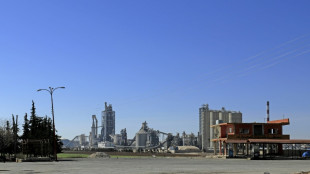
-
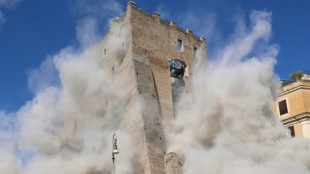 Worker dies after medieval tower partly collapses in Rome
Worker dies after medieval tower partly collapses in Rome
-
Run-machine Labuschagne in form of his life ahead of Ashes

-
 Prince William plays football, volleyball in Rio on climate trip
Prince William plays football, volleyball in Rio on climate trip
-
Jamaicans mobilize aid in aftermath of Melissa's wreckage

-
 Starbucks cedes China control to Boyu Capital
Starbucks cedes China control to Boyu Capital
-
'Wild at Heart' actress Diane Ladd dies at 89

-
 Xhaka lifts Sunderland into fourth after Everton draw
Xhaka lifts Sunderland into fourth after Everton draw
-
Brazil records biggest annual fall in emissions in 15 years: report
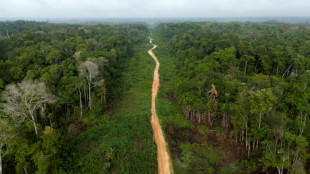
-
 Victor Conte, mastermind of BALCO doping scandal, dead at 75: company
Victor Conte, mastermind of BALCO doping scandal, dead at 75: company
-
Trial opens in 1st US civil case on 2019 Boeing MAX crash

-
 Barrett brothers out of All Blacks' clash with Scotland
Barrett brothers out of All Blacks' clash with Scotland
-
Medieval tower partially collapses in Rome, trapping worker
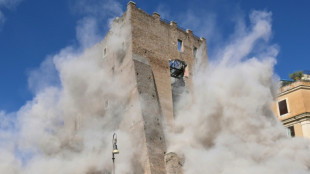
-
 Arsenal's Arteta says injured Gyokeres out of Slavia Prague tie
Arsenal's Arteta says injured Gyokeres out of Slavia Prague tie
-
Alonso says 'quality' Wirtz helped get him Real Madrid job


Black Death origin mystery solved... 675 years later
A deadly pandemic with mysterious origins: it might sound like a modern headline, but scientists have spent centuries debating the source of the Black Death that devastated the medieval world.
Not anymore, according to researchers who say they have pinpointed the source of the plague to a region of Kyrgyzstan, after analysing DNA from remains at an ancient burial site.
"We managed to actually put to rest all those centuries-old controversies about the origins of the Black Death," said Philip Slavin, a historian and part of the team whose work was published Wednesday in the journal Nature.
The Black Death was the initial wave of a nearly 500-year pandemic. In just eight years, from 1346 to 1353, it killed up to 60 percent of the population of Europe, the Middle East and Africa, according to estimates.
Slavin, an associate professor at the University of Stirling in Scotland who has "always been fascinated with the Black Death", found an intriguing clue in an 1890 work describing an ancient burial site in what is now northern Kyrgyzstan.
It reported a spike in burials in 1338-39 and that several tombstones described people having "died of pestilence".
"When you have one or two years with excess mortality it means that something funny was going on there," Slavin told reporters.
"But it wasn't just any year -- 1338 and 1339 was just seven or eight years before the Black Death."
It was a lead, but nothing more without determining what killed the people at the site.
For that, Slavin teamed up with specialists who examine ancient DNA.
They extracted DNA from the teeth of seven people buried at the site, explained Maria Spyrou, a researcher at the University of Tuebingen and author of the study.
Because teeth contain many blood vessels, they give researchers "high chances of detecting blood-borne pathogens that may have caused the deaths of the individuals," Spyrou told AFP.
- 'Big Bang' event -
Once extracted and sequenced, the DNA was compared against a database of thousands of microbial genomes.
"One of the hits that we were able to get... was a hit for Yersinia pestis," more commonly known as plague, said Spyrou.
The DNA also displayed "characteristic damage patterns," she added, showing that "what we were dealing with was an infection that the ancient individual carried at the time of their death."
The start of the Black Death has been linked to a so-called "Big Bang" event, when existing strains of the plague, which is carried by fleas on rodents, suddenly diversified.
Scientists thought it might have happened as early as the 10th century but had not been able to pinpoint a date.
The research team painstakingly reconstructed the Y. pestis genome from their samples and found the strain at the burial site pre-dated the diversification.
And rodents living in the region now were also found to be carrying the same ancient strain, helping the team conclude the "Big Bang" must have happened somewhere in the area in a short window before the Black Death.
The research has some unavoidable limitations, including a small sample size, according to Michael Knapp, an associate professor at New Zealand's University of Otago who was not involved in the study.
"Data from far more individuals, times and regions... would really help clarify what the data presented here really means," said Knapp.
But he acknowledged it could be difficult to find additional samples, and praised the research as nonetheless "really valuable".
Sally Wasef, a paleogeneticist at Queensland University of Technology, said the work offered hope for untangling other ancient scientific mysteries.
"The study has shown how robust microbial ancient DNA recovery could help reveal evidence to solve long-lasting debates," she told AFP.
W.Lapointe--BTB




